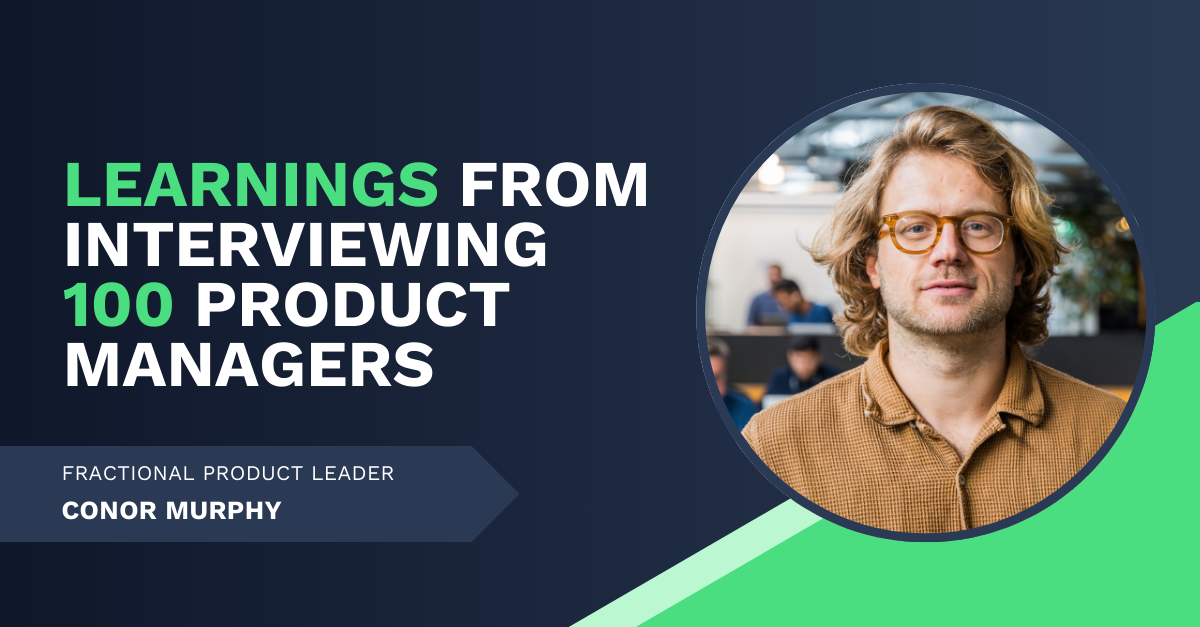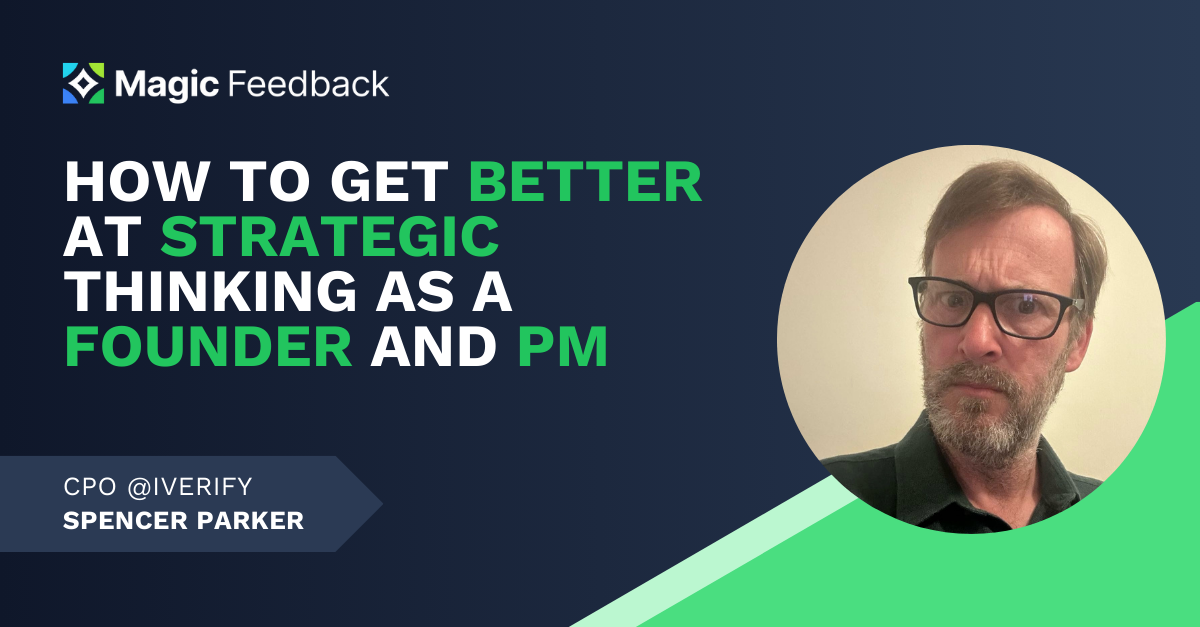
In this thought leadership article, I’m speaking with Lead Product Manager, Conor Murphy, about what he learned from interviewing more than 100 product leaders as part of his startup discovery process. In this article he shares the biggest misconceptions between the ‘Linkedin reality’ and that of the Product Managers actual ‘day to day’ reality.
In 2023, Conor was exploring a startup idea called Olta. He then decided to go on a 6-month journey to better understand how product teams work together. During that time, he pivoted again and again as he tried to find a niche that clicked. And in the process of doing so, Conor interviewed more than 100 product managers.
According to Conor, one of the first insights was that what he called LinkedIn product management vs the real world:
“The quickest and strongest insight that came out was that nobody was doing the very framework-based and objective-based product management that you always hear about from LinkedIn influencers in the product management space. Out of the 100 people I interviewed, I never found anyone who worked that cookie cutter way, and only very few people would get near it.”
Conor also mentions how most product managers believed that everyone else were working the way you often hear about from LinkedIn influencers:
“There were a fair amount of people I interviewed who believed they did a terrible job because LinkedIn influencers were telling them that this is how good companies should work.”
In addition to that, Conor experienced firsthand how people who worked at companies that supposedly used all of these modern frameworks didn’t use them at all:
“They would sometimes say this is how great companies like Google work. I had to tell people no, it’s not. I interviewed people from Google, and that was not the case at all. Sometimes I would have calls where people would spend 5 minutes at the end just thanking me for telling them that fact. Some of the product managers I spoke with were shipping fast and measuring their impact. I told them that just trying to do that is in the top 10% of teams.”
Throughout his interviews, people repeatedly expressed anxiety about not doing product management the right way. So if you’re reading this and feel the same way, Conor feels we should be easier on ourselves. Most product managers don’t work with frameworks or totally outcome-based product management.
However, Conor learned a lot more than just that during his research. According to Conor, many product teams have a simple and clear idea of what they want to do on a high level:
“Roughly speaking, they want a fast shipping team and some metric goal to prioritize most of the work around. Next, they want to be a fast learning team. And in that fast learning arena, a lot of product managers are looking towards continuous discovery.”
And when it comes to talking to users and product discovery, Conor made some interesting findings:
“Most product managers are very aware of the term product discovery. Many product managers at least want to do something like it. But it’s still very few who actually do it. Most of them are still busy getting to a fast shipping product team.”
In fact, in Conor’s discovery process, he was quite surprised by just how few product managers just talked to users on a regular basis:
“It is quite shocking. That is probably the one thing that surprised me the most. I would have guessed that maybe half of the product managers I would speak to would talk to users on a regular basis. In reality, I would say it’s only about 20%.”
But what were some of the reasons behind product managers not talking to users? According to Conor, there were several reasons most don’t talk to their users.
“It is definitely not a dislike of it. Everyone told me how they felt re-energized whenever they actually go and talk to customers. In a small number of companies, they explained how the culture of the company is blocking it or you have to go through sales. But the major reason from my conversations was that if you are on a roadmap anyway, what’s the point? If you have a three-month backlog, then you are probably going to execute it as is with only minor variations. In this case the leverage of talking to users constantly and learning is perceived quite low.”
Conor also mentions how time pressure appears to be the enemy of customer discovery:
“You can imagine the ideal process is you go talk to users, synthesize and document insights. But as time pressure happens, product managers stop doing the synthesis and documenting the insights. And then you stop talking to users as you don’t really get the end results out of it anymore. So between a culture of the company that does not reward talking to users and it just being time-consuming, customer discovery is always one of the first things to fall and one of the easiest habits to drop in the short term.”
But what about the product managers who do talk to users? What were the insights from those teams? According to Conor, the culture is often key:
“They have a culture and characteristics that allow them to. It can be things like designers being happy to pitch in, or sometimes developers jump on the call if it’s user research on the analytics side. It’s much easier to stay consistent on user interviewing if everyone helps and pitches in, and things can be picked up.”
And when it comes to ways to improve how they conduct user interviews, according to Conor, product managers are often very honest with their managers:
“Often, product managers would be honest about their shortcomings with their managers. And definitely, a decent amount of product managers explained how they were always wary of whether their research was good enough. But, I would say it’s often one of those things that if you are self-aware enough to think your research might be bad, it is probably not that bad. But there definitely is a bit of fear there.”
Throughout his interviews, Conor learned a lot, but one thing that he did not expect was how most product managers were trying to use frameworks:
“The final area that I found interesting was that no one uses frameworks as they are “meant” to be used. No one does the Jobs To be Done framework by the book. No one does opportunity solution trees by the book. That is largely because even if you followed the framework of the Jobs To be Done framework, then you had to spend your whole life explaining to everyone else in the company how it works. And eventually you get tired of that if use it religiously. So you just come back to talking about user problems. The same happens with opportunity solution trees.”
What is one piece of advice you would like to give to other product managers and aspiring product managers?
“There was a point in my career I was getting quite annoyed at being blocked. I was working on this big company transformation from the ground up. It was a very CEO-driven company, and suddenly one year’s work was blocked when the transformation appeared out of nowhere at the CEO’s level. He just blocked it. And I was furious at the time. But then someone who was advising me asked me why I acted as if the company was perfect, that nowhere is perfect and yet I had acted as if doing purely logical arguments will always win rather than working with the companies structures a bit. No one likes a fundamentalist preacher. You need to recognize both who you are and what the company is, not what it says it is, and match those two things as much as possible.”


